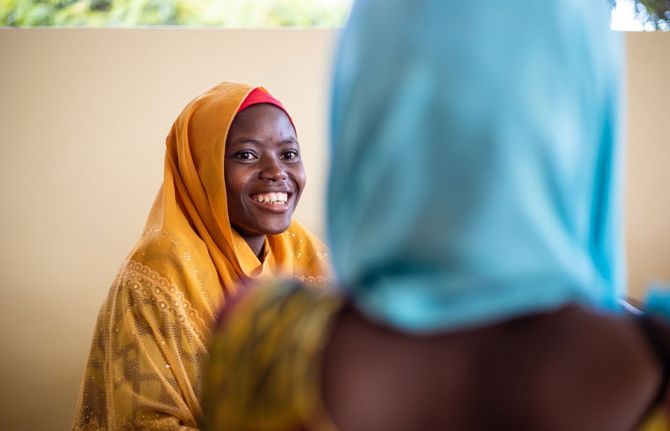

Feature Story
Gender equality and justice critical for ending AIDS
10 June 2021
10 June 2021 10 June 2021On 10 June, representatives of the United Nations, Member States, young women’s movements and civil society laid out strategic pathways for advancing gender justice and women’s rights and agency at a thematic panel, Advancing Gender Equality and Empowering Women and Girls in the AIDS Response, held during the United Nations High-Level Meeting on AIDS.
Despite significant progress in the HIV response, the epidemic continues to take a heavy toll on women and girls. This was an opportunity to reflect on the realities of women and girls in all their diversity in the context of the HIV response and to share forward-looking recommendations on gender equality.
The event came on the heels of a new global pledge by world leaders to reduce the annual number of new HIV infections and AIDS-related deaths, eliminate new HIV infections among children, end paediatric AIDS and eliminate all forms of HIV-related discrimination by 2025. Governments missed the targets made in 2016 to reduce the number of adolescent girls and young women aged 15–24 years becoming newly infected with HIV to 100 000 per year by 2020.
Phumzile Mlambo-Ngcuka, the Executive Director of UN Women, noted the enormous work yet to be done, especially with the challenging convergence of gender-based violence, COVID-19 and HIV, with increased levels of violence against women and girls during lockdowns, spiking by up to 500% in some countries.
Nadine Gasman, President of the National Institute for Women, Mexico, shared best practices from Mexico, where municipal authorities and civil society have worked together to improve access to comprehensive quality HIV services for left-behind populations, such as transgender people, and integrated HIV and sexual and reproductive health services for women living with HIV as well as for gay men and other men who have sex with men and people who inject drugs.
The panel noted that many women, girls and gender-diverse communities at higher risk of and living with HIV are being left behind in HIV testing, treatment and care services. Women and girls continue to face intersecting forms of discrimination, stigma, violence and criminalization.
Particular concern was raised about adolescent girls and young women in sub-Saharan Africa, who remain at intolerably high risk of HIV. In 2020, six in seven new cases of HIV among adolescents between the ages of 15 and 19 years in the region were among girls. The participants stressed the importance of leveraging education, particularly girls’ completion of quality secondary education, as a powerful entry point for accelerating HIV prevention, gender equality, an inclusive environment free of stereotypes, economic empowerment and preventing gender-based violence.
Education Plus, a bold new initiative co-led by the heads of UNAIDS, UN Women, the United Nations Population Fund, the United Nations Educational, Scientific and Cultural Organization and the United Nations Children’s Fund that is calling for high-level political action for the empowerment of young women and girls in sub-Saharan Africa to urgently reduce HIV was hailed as a timely and much needed response. Many emphasized the need to put gender justice at the heart of the HIV response and the sustained meaningful engagement and inclusion of adolescent girls and young women in decision-making at all levels.
The calls to action stressed the importance of scaling up investments in gender-transformative interventions and support for young people’s movements and leadership in the HIV response, legal and policy reforms in parental consent requirements that undermine the right to health of adolescents, the protection of the sexual and reproductive health and rights of all women and adolescent girls and urgently scaling up comprehensive HIV prevention programmes as well as engaging men and boys in transforming harmful gender norms and promoting positive masculinities.
Quotes
“We are closer to ending AIDS than ever before, but HIV is not over, with unacceptably high new HIV infections among adolescent girls and young women in sub-Saharan Africa. Through Generation Equality we will take urgent action on key issues, including women’s bodily autonomy and gender-based violence, working in solidarity through an intergenerational coalition of governments, civil society, feminist and youth organizations, the private sector, philanthropy and international organizations. By working together to address gender inequalities we can drive systemic and lasting change.”
“Now is the time for all of us in the global community to come to grips with the intersecting exclusions and inequalities that perpetuate this crisis. We need radical and rapid transformation of harmful gender norms and practices. But to make that happen, we must give those most affected by HIV a louder voice in our conversations, so they can contribute to the solutions.”
“Criminalization and punitive laws and policies based on sexual activity, sexual orientation and gender identity, drug use and HIV status further expose adolescent girls and young women from key populations to extreme levels of violence, stigma and discrimination. Such laws and policies only drive them further from accessing the HIV prevention and treatment services they need, with little if any recourse to gender and social justice for violations of their rights.”
“We need to enhance our collaborative initiatives between the communities and the schools and realize that the school is a microcosm of what society looks like. The school and the classroom are a reflection and mirror of our communities, and communities mirror what is happening in the classrooms. I implore all of us to make that investment now in adolescent girls, young women and boys as well.”
‘’Any discussion about women’s agency and full participation in decision-making to strengthen HIV prevention and the AIDS response must be anchored in fulfilling a core element of women’s empowerment that cuts across their education, health and economic security: that is, the full respect and protection of their sexual and reproductive health and rights.”



